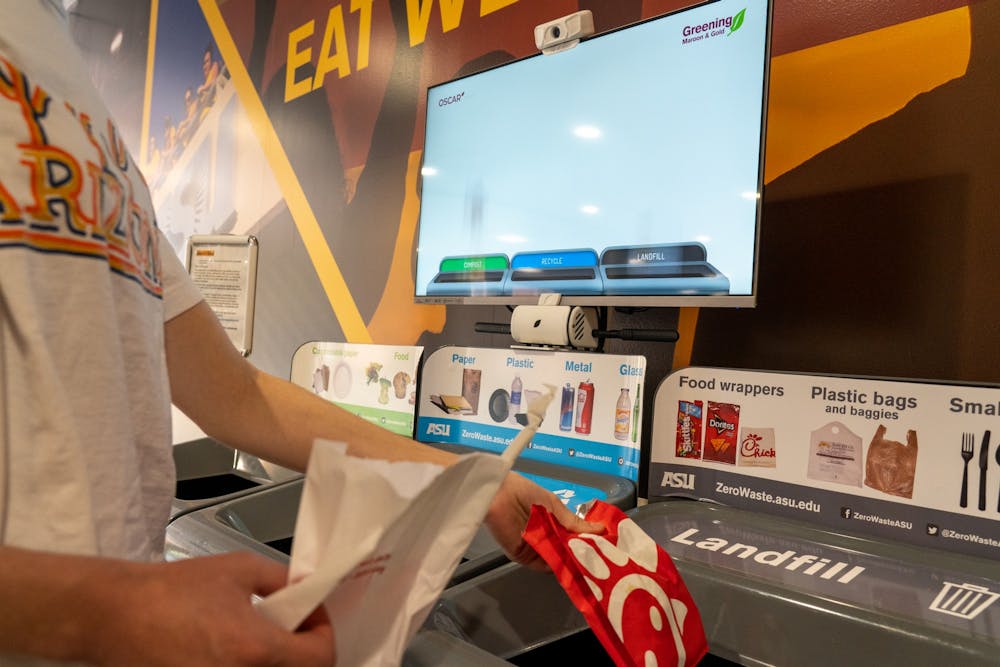ASU is enhancing its efforts to improve landfill diversion with a new type of waste-sorting system installed last week.
Sustainability ambassadors at the Student Pavilion, in partnership with Zero Waste, are piloting a new artificial intelligence waste sorting machine known as the Oscar Sort, which identifies what type of waste is being thrown away.
With the amount of foot traffic through the MU, it was necessary to find a way to not only educate the people who come but also to increase community engagement.
Casey Rapacki, a senior studying sustainability and sustainability ambassador to the Student Pavilion, is one of the leads on the project. She said it's difficult to make sure all the people at the MU are throwing trash away correctly.
“We still are struggling to get students and visitors and staff and faculty to sort their items when they get to the bin,” Rapacki said. “When we found (the Oscar Sort), it was the first thing that we’d ever seen that works to correct behavior instead of in the moment fixing the sorting. In other words, you are teaching the patrons that are throwing their things out.”
Oscar Sort is a large screen directly above the bins that uses a camera to identify the waste as recycling, landfill, or compost before it's thrown away, unlike other models that sort after disposal.
Rapacki said with the pandemic, the MU's busy location and a rise in single-use items will get the best data out of the Oscar Sort. The location is ideal because it's a hub for students and visitors.
"We thought this was a really good time to collect the data," Rapacki said. "We found that collecting data during a pandemic when people are going back to using a lot of single-use gives us a chance to reflect on this and have very stable numbers to look back at once we have more people on campus."
To improve the trial's effectiveness, the team incentivized the process. Upon correct disposal, the screen will display a QR code that leads to a drawing to win a $25 gift card for Maroon and Gold dollars that can be used at any Sun Devil Dining location.
Alexandra LoPiccolo, another sustainability ambassador to the Student Pavilion and a graduate student who is also a lead on the project, said the gift card reward was intended to drive engagement with the project.
“It was just a way to incentivize people to engage with it,” LoPiccolo said. “I think that’s one of the most difficult things about having new things on campus. People aren’t sure, what does it do, how does it work, and so to kind of incorporate that engagement, who wouldn't want a couple extra bucks to spend at the MU?”
The hope is for the pilot project to eventually place more Oscar Sorts across ASU's campuses, bringing more awareness to the need for waste diversion.
The team found the machine while searching for ways to better accomplish its goal of zero waste. After discovering the Oscar Sort, the team was able to obtain the Sustainability Initiatives Revolving Fund grant which provided them funding for a one-year subscription to the machine.
"Our project and grant proposal with the Oscar is essentially a trial run right now," LoPiccolo said. "We are testing it out on campus, seeing what results it yields and (will) assess the situation."
Kendon Jung, a graduate student studying design, the environment and the arts and the program manager at Zero Waste, said the department cannot be everywhere at the same time, so Oscar Sort helps the team get the data necessary to "see what works."
Jung said by identifying the importance of landfill diversion, the Oscar Sort can help people stop and take a moment to make the right disposal decision. He said the project makes the MU an "exemplar that constantly strives for better sustainability."
"In these types of spaces, the diversion rate is not great," Jung said. He said the technology should help address confusion "specifically around education of what is or is not recyclable, compostable or landfill, as well as using pictures instead of text to better help translate the situation."
Reach the reporters at ljchatha@asu.edu and follow @LukeJC2 on Twitter.
Like The State Press on Facebook and follow @statepress on Twitter.
Continue supporting student journalism and donate to The State Press today.

Luke Chatham is a Community & Culture reporter and previous Business and Tech reporter. He also worked in the studio production crew for Cronkite News and is currently a freelance reporter and writer for Arcadia News.




